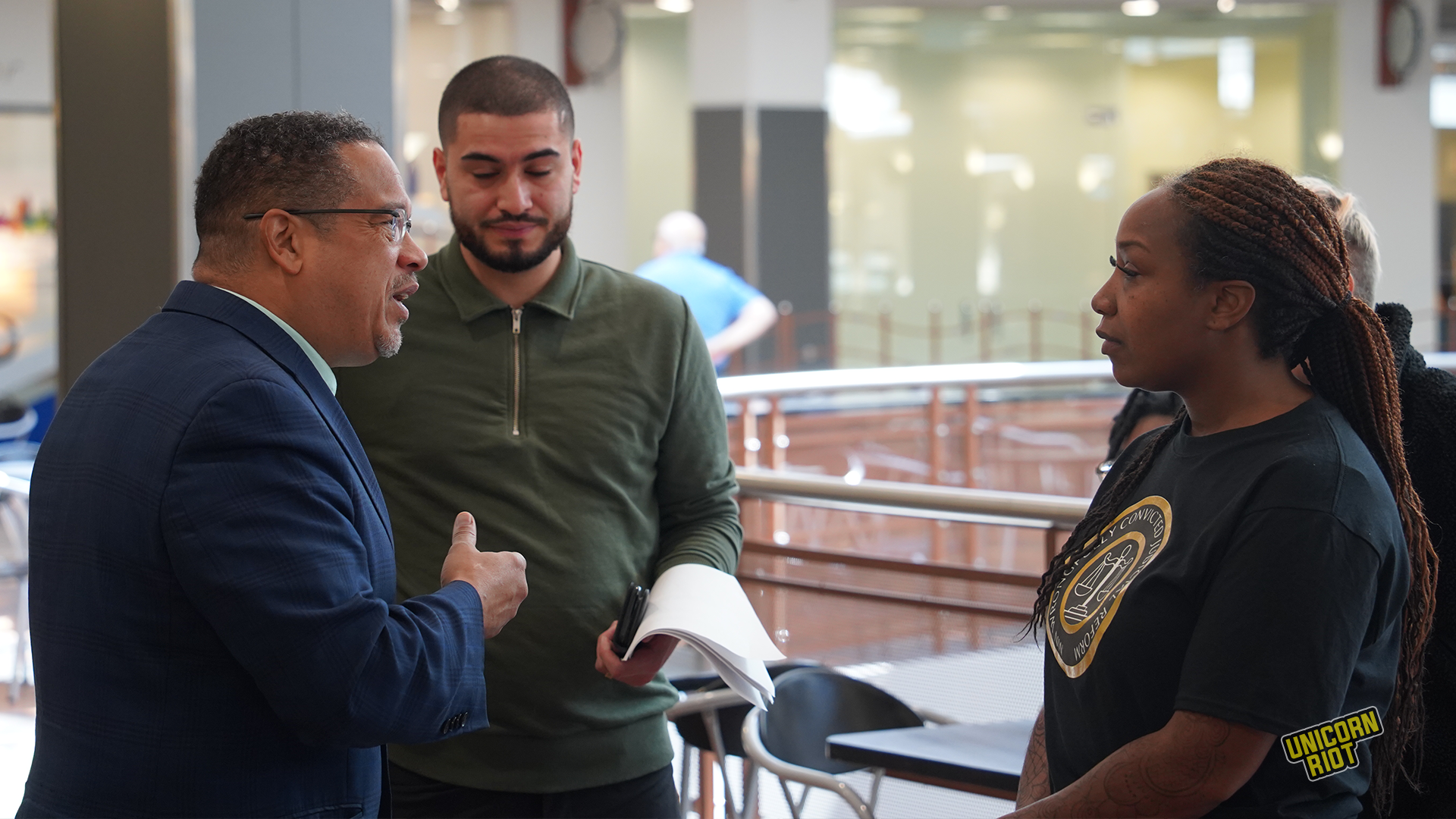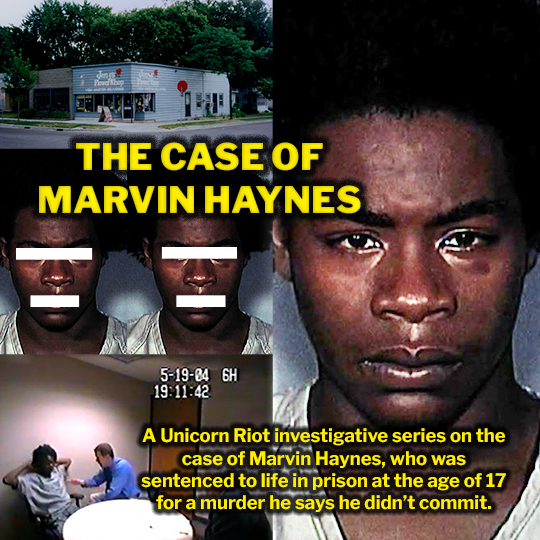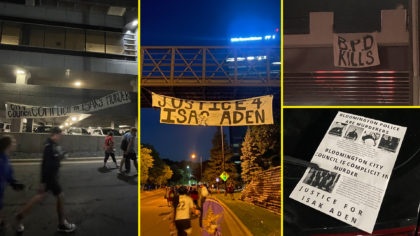Limited Funds Stunt Minnesota’s Conviction Review Unit — Families Want Expediency
With hundreds of applications to review, the CRU has officially only completed one investigation in nearly two years.
Minnesota’s Conviction Review Unit (CRU) has received nearly 1,000 applications of wrongful incarceration to review but with only a couple paid staff and four grants in two years, impacted families complain about lengthy waits while the CRU say they lack capacity and funding. Created to prevent, identify, and remedy wrongful convictions, the state’s first-ever CRU began accepting applications in August 2021 — after the first quarter of 2023, it had completed only one official investigation.
Seeking transparency on the unit as time continues to pass, advocates and families of many wrongfully incarcerated people languishing in Minnesota prisons have publicly confronted the CRU, complaining of inaction. One of the main organizers behind the demands for expediency is Marvina Haynes, whose brother Marvin Haynes has spent his entire adult life in prison.
- What is the CRU?
- Nearly 1,000 Applications — Main Complaint = Time
- Steps in CRU Investigations
- Mary Moriarty Takes Over as Hennepin County Attorney, Plans to Create Hennepin County Conviction Integrity Unit
- Calls for Better Communication and Pleas for More Funding
- Families Continue Waiting — Demand Action From Moriarty
- Small Steps as Hope Fades in Time
Incarcerated since 2004, Marvin Haynes was a teenager when he was given a life sentence for a Minneapolis murder based on false allegations. Every night for nearly 20 years now, Haynes and his family have gone to sleep with little hope that he’ll ever be released from the prison cell he resides in at Minnesota Correctional – Stillwater.
Getting released from prison on a murder charge is an extremely rare occurrence — only two people in Minnesota have been exonerated from their murder charges since 1989, one being on a technicality.
With no CRUs, or Conviction Integrity Units as they’re also called, Minnesota has only seen 22 total exonerations in the past 34 years, according to The National Registry of Exonerations.
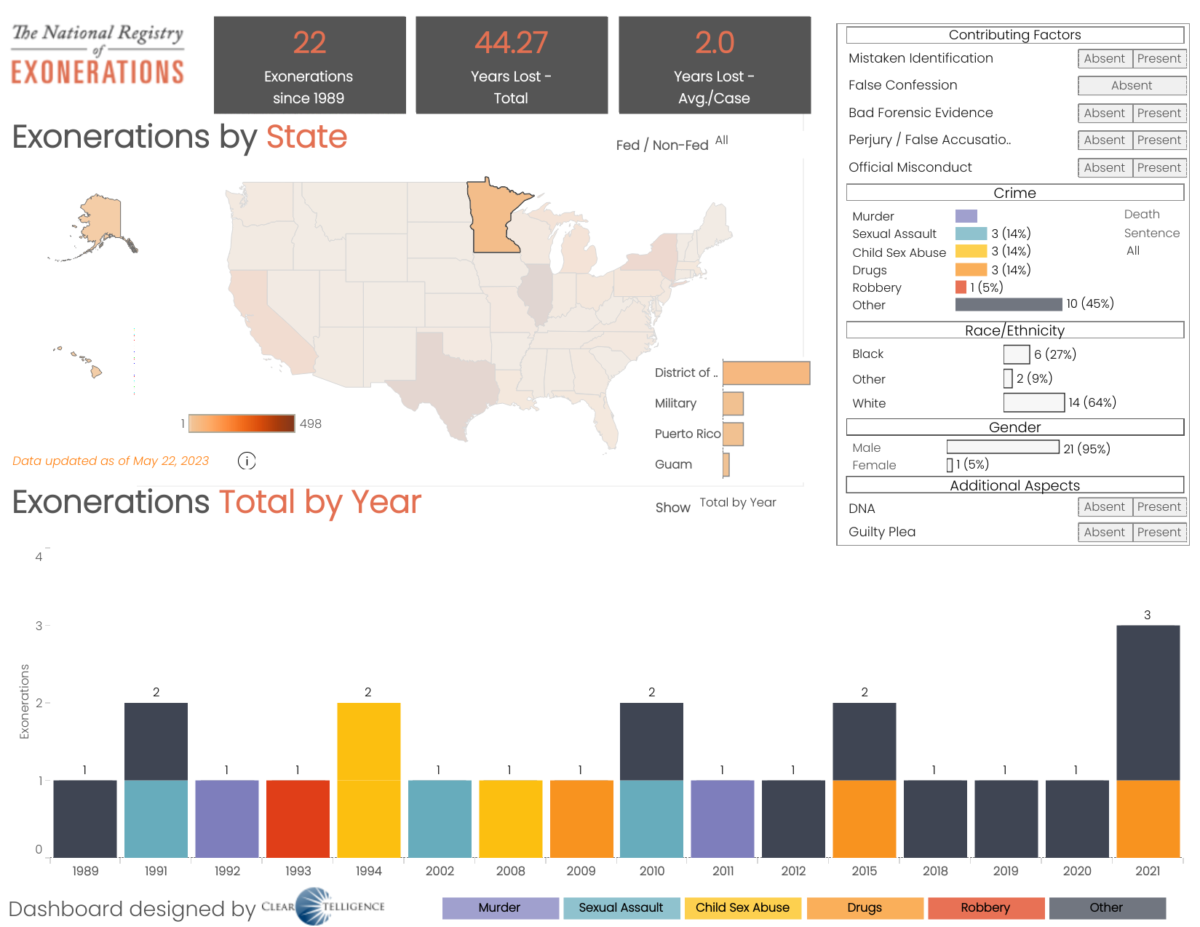
Haynes, however, has tried to remain optimistic that somehow the powers that be could hear his truth and more importantly, give him some justice by releasing him from prison. After the creation of the Conviction Review Unit, hope had cautiously been renewed in Haynes and his family.
Over the years, Haynes, along with his family and independent investigators, had been collecting and collating the documents from his trial and legal defense. The Great North Innocence Project (GN-IP) worked with Haynes to re-investigate his case. They reviewed the documents procured by Haynes, collected affidavits from people who testified at his trial, and crafted a 72-page application for exoneration that was received by CRU in December 2022 (pdf).
See Haynes’ CRU application, court documents and Unicorn Riot’s full investigative series on The Case of Marvin Haynes, including a 33-minute film.
Not hearing anything for months after having turned in the CRU application, Marvin’s sister, Marvina, organized protests to draw awareness to Marvin’s case and demand action.
After a planned rally at Minnesota Attorney General (AG) Keith Ellison’s office was announced on social media in March 2023, the AG office arranged a meeting with Marvina who then pushed back the action. A month later, in late April 2023, nearly four dozen people, many with incarcerated family members, packed a conference room in downtown Saint Paul’s Town Square Complex to meet with Ellison about the CRU.
What is the CRU?
Minnesota’s CRU is a partnership between the GN-IP and the Minnesota Attorney General’s Office. It is one of only a handful of CRUs in the country partnered with its state AG office. The CRU was started after the U.S. Department of Justice (DOJ) awarded a $300,000 grant in October 2020 to fund the unit’s formation. The DOJ grant was renewed last fall for two-years at $500,000 (pdf).
The CRU has so far been funded solely by grants and has received a total of less than $1M in the span of 21 months from the period of beginning to accept applications in August 2021 until April 2023. Along with the DOJ grant, the Minneapolis Foundation gave a two-year $310,000 grant to hire a paralegal and $100,000 came from the Pohlad Foundation for an investigator.
Providing individualized support to help formulate the CRU was the Quattrone Center, a national research and policy hub that works to “catalyze long term structural improvements to the U.S. criminal justice system.”
An Advisory Board was formed in January 2021 to “advise the Attorney General on the establishment, functioning, and hiring of the unit. the unit’s policies and practices … and make policy recommendations.” The current Advisory Board members, as of mid-2023, includes former judge Paul Anderson and both Ramsey and Hennepin County Attorneys John Choi and Mary Moriarty. Community representatives and other professionals working within and out of the legal system are also on the Advisory Board; Tamara Cabán-Ramirez, Nadine Graves, Sara Jones, Laura Nirider, Caroline Palmer, Karin Sonneman, Elizer Darris, Fred Friedman, John Littlewolf, Mark Osler, Bishop Harding Smith, and F. Clayton Tyler.
“We will fearlessly review cases to make sure justice was served, and if not, to right those wrongs. Prosecutions where justice is not served hurt everyone and benefit no one except the true perpetrator,” said AG Ellison on the creation of the CRU. His office has hailed the unit’s charter (pdf) as “one of the most expansive charters of a conviction review unit in the United States.”
Executive Director of GN-IP and CRU Advisory Board member, Sara Jones, who was instrumental in forming the CRU, expressed excitement when the unit formed, saying, “we see [the CRU] as an innovative addition to our own existing work to free wrongfully convicted people and improve the justice system to prevent wrongful convictions.” Jones’ father, C. Paul Jones, was Minnesota’s first state public defender.
The unit’s Director is Carrie Sperling. She has decades of experience dealing with wrongful convictions and had previously served as Director of the Arizona Justice Project. She was hired in April 2021 and was the only paid full-time CRU staff for the first year. Paid staff on the CRU currently include Sperling, a paralegal, a part-time secretary and a part-time contract investigator.
Sperling published a 33-page packet on the specifics of MN’s CRU program in March 2023, see below (pdf).
Nearly 1,000 Applications — Main Complaint = Time
CRU Director Sperling sat next to AG Ellison during what was scheduled to be a one-hour meeting on April 25, 2023 at the Town Square complex. Long after Ellison left, Sperling continued to speak with the nearly four dozen people that showed up. Marvina Haynes had previously invited several impacted families, advocates, and numerous press outlets, including Unicorn Riot, to the meeting. However, Ellison, who at times took an adversarial/hostile tone against the crowd, including directly at impacted family members, called the actual meeting “off the record” before it started.
The next day, Ellison briefed the CRU Advisory Board about the meeting at Town Square during a public Zoom meeting, which Unicorn Riot also attended. Ellison told the Board that some of the participants in the Town Square meeting said they were “glad to know more about the process and others were saying we weren’t moving fast enough.”
Sperling, who was the person that invited the Town Square crowd to the April Advisory Board meeting, presented a PowerPoint to the Board. One of Sperling’s first presentation slides was one that noted the main complaint that the CRU receives — time.
Sperling said that as of March 31, 2023, there were 224 applications of convictions to review with 978 received and 19 currently being taken in. The intake process can take up to 90 days for each application. Director Sperling said they have 12 open investigations and they’ve completed one, that of Thomas Rhodes.
In January 2023, Rhodes was the first person that the CRU freed from prison when he had his first and second-degree murder sentence vacated. In the Advisory Board meeting, Sara Jones said they’d been trying to free Rhodes for 10 years and weren’t able to until the CRU was formed.
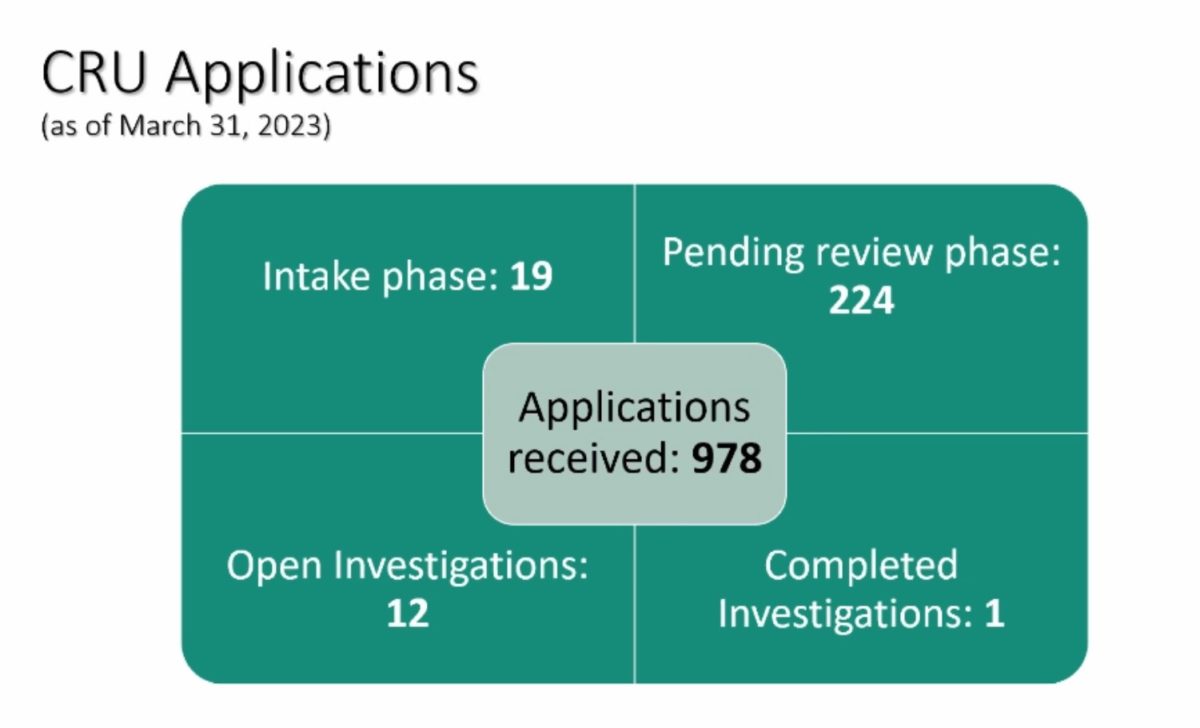
Ellison interrupted Sperling during the Board meeting when she said they’d completed only one investigation to say that he told the Town Square meeting that three investigations were completed. He said he counted his and the Innocence Project’s involvement in the Myon Burrell case as well as the case of Jonas Nelson.
Burrell’s life sentence was commuted in 2020 and he was released through a different process. Jonas Nelson‘s life sentence without parole was upheld by Minnesota’s Supreme Court a few years ago. Both of those cases have since been incorporated into the CRU. In February 2023, Burrell’s CRU application became one of CRU’s open investigations and due to critiques on how the 2020 review process occurred, the CRU will reportedly choose a “new” group of people to conduct the review of the prosecutor files.
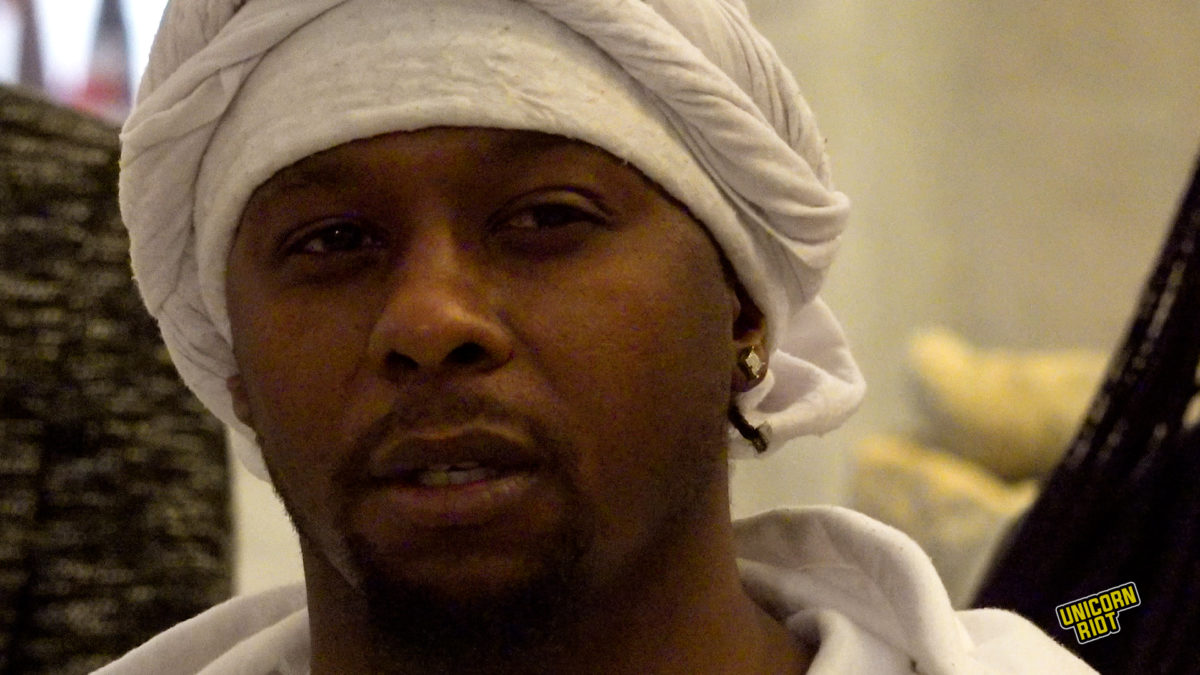
An aspect of the many difficulties getting wrongfully incarcerated or overly sentenced people out of prison are dealing with courts and county attorney’s offices. Both are often unhelpful or unable to help because of incomplete police reports, incomplete investigatory reports or missing paperwork.
Sperling noted that Rhodes’ case was the best one to start out with as the CRU had direct access to his case files.
Steps in CRU Investigations
In attempts to provide more transparency on what goes into CRU investigations, Director Sperling went over three specific slides in the April Board meeting, detailing some of the steps they take after receiving the application.
The initial steps to their investigation include; signing a cooperation agreement, getting an MOU (Memorandum of Understanding) with the County Attorney, notifying any victims, reviewing the materials from the applicant, reviewing the entire law enforcement file, listening to and watching recorded interviews, reviewing court proceedings and transcripts, consulting experts, and reviewing co-defendants’ cases.
The next steps include interviewing witnesses, the trial and appellate counsel/s, prior defense investigators, officers involved in the case and prosecutors. Forensic testing is then conducted and experts are consulted.
The final steps are to prepare a report and recommendation, meet with the victims, meet with the county attorneys, and meet with the applicant’s counsel. The AG then reviews the report, communicates final recommendation to victims and County Attorney, and they set forth to implement any recommended case correction in the district court.

Mary Moriarty Takes Over as Hennepin County Attorney, Plans to Create Hennepin County Conviction Integrity Unit
Hennepin County Attorney Mary Moriarty stated in April that she plans to follow through with a campaign promise and create a Conviction Integrity Unit to review wrongful convictions in Hennepin County.
Moriarty won the 2022 election and took over as the first openly gay women to be elected Hennepin County Attorney after a nearly three-decades-long reign by Mike Freeman. Freeman served as County Attorney from 1991-1999 and 2007-2023. Amy Klobuchar, currently a U.S. Senator, served as Hennepin County Attorney from 1999-2007.
Spawning from prosecutions overseen by Freeman and Klobuchar in the late 90s and early 2000s, droves of families have been speaking out in recent years saying that their loved ones are innocent and or received unjust sentences.
“The mentality that was going on at that time period was just literally, we’ve got to do something
about the street crime and we don’t give a damn who did it, we’re just going to lock up all these guys,” Michelle Gross, President of Communities United Against Police Brutality, previously said to Unicorn Riot about the reign of Freeman and Klobuchar. “And they just took a whole generation of young Black men and threw them off into the prison system.”
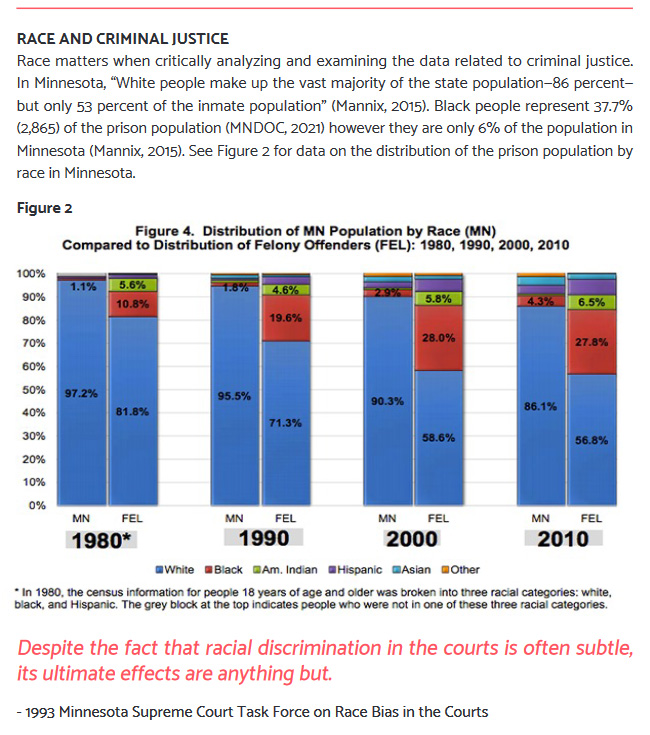
Furthermore, Mike Freeman had been a target of protests for years with activists saying he was soft on police and white criminals and especially harsh on Black suspects. Protests calling for charges against the officers who killed Jamar Clark in 2015 held a series of ‘Freeman Fridays’ actions. Dozens of activists would flood Freeman’s office to demand he charge the officers, march through the downtown skyway at lunch time and share updates from the ongoing movement.
Soon thereafter, Freeman’s home became a target of protests including those seeking charges for the killers of Brian Quinones-Rosario among others.
The Hennepin County Attorney’s Office (HCAO) has the power to charge police officers of wrongdoing and on the third day of the George Floyd Uprising, Freeman publicly announced that he didn’t see enough evidence to charge the officers involved. That night, the Minneapolis Police Third Precinct was overrun by the community and set aflame. The next day, Freeman charged Derek Chauvin with third-degree murder.
Two days later, Ellison took over the case and amended the charges to second-degree unintentional murder. Two months after George Floyd’s killing, Freeman sold his home and moved.
It is in this culture that Moriarty has taken over as head of the HCAO. Moriarty was previously the county’s chief public defender and had campaigned on police accountability and criminal justice reforms while gaining the trust of a wide and cross-racial range of working class Minneapolis.
The HCAO originally didn’t cooperate with the CRU and declined to send the case files after Myon Burrell was released from prison in 2020. Freeman reportedly cited CRU’s charter language that stated the unit “shall prioritize claims of actual innocence brought by individuals who are currently in custody” as reasons why they wouldn’t cooperate with the CRU.
This is one of the main obstacles that CRU faces, uncooperative or unresponsive county attorneys.
The Moriarty-run HCAO immediately reversed course and days before she was sworn in, Moriarty provided all of Burrell’s case files to the CRU.
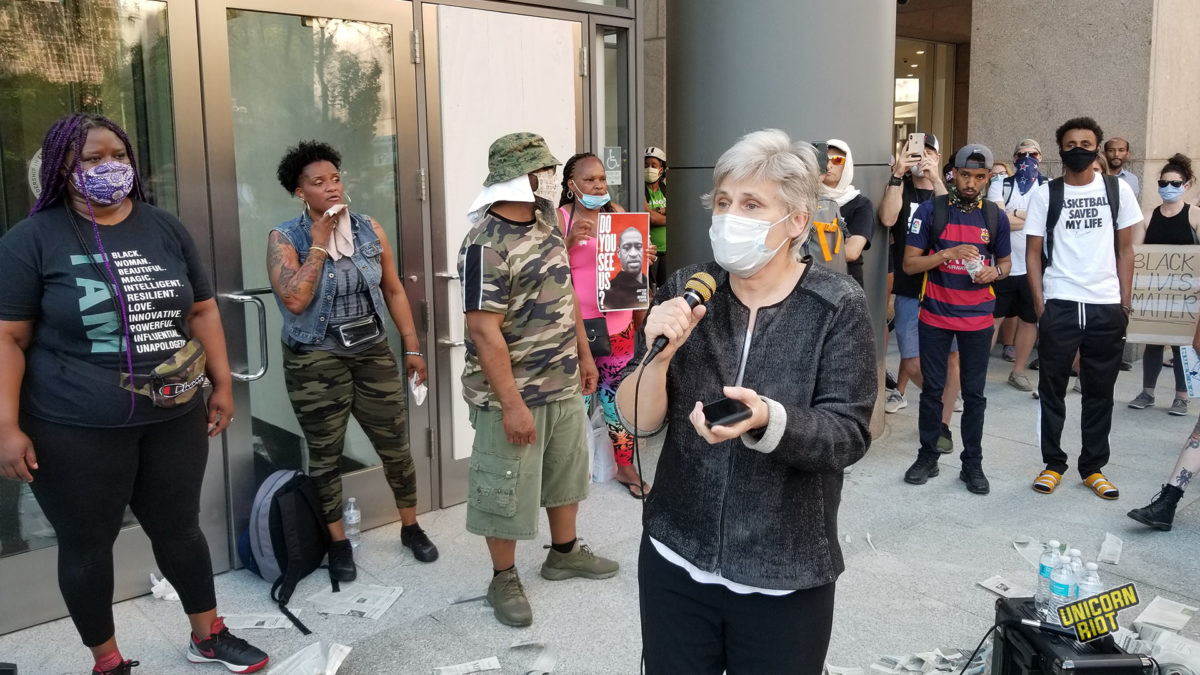
Calls for Better Communication and Pleas for More Funding
During the April Board meeting, Moriarty called for better communication with CRU applicants’ and their families. She noted that families from Hennepin County that applied to the CRU have been getting “mixed messages about what’s happening with their cases.” Moriarty continued, “I can only imagine that’s frustrating for them.”
A lot of the Board discussion revolved around the complaints that family members were having, that of time and the families’ and incarcerated loved ones’ feeling ignored. Sperling said they send a letter every 120 days to applicants to give an update on the numbers “but sometimes that looks like we’re ignoring.”
Judge Anderson asked Sperling if the CRU gives the families “any hope” in their communications. “Not really” said Sperling. Understandably so, having the daunting task of reviewing and investigating hundreds of applications with such a limited capacity. Board members discussed ways in which the CRU could provide more information in communication updates with the families and potentially sprinkle in some hope.
During a conversation prompted by Ramsey County Attorney John Choi about needing support services for the families, Sperling noted that she sometimes worries that “while they wait [for CRU application reviews] they may miss other opportunities to request clemency.”
The main need of the CRU at this point is funding to provide more staff. Director Sperling listed ways the CRU is attempting to reduce the time awaiting application resolutions — they mostly included the need for funding. Sperling said they need to secure the staff they have and fund more staff, particularly a full-time investigator. She pushed the Board members to advocate for legislative support, outside funding, and to advocate for post-conviction reforms and for local CRUs across the state.
Before he left the April Board meeting prior to it ending, Ellison said to the listeners on the call that were also in the Town Square meeting, “we heard you yesterday, we are grateful for your input and most of all, we need your help. So let’s keep working together.”
To end out the Board meeting, Ellison’s outreach coordinator Keaon Dousti, who’s worked alongside Sperling, organized time with Toshira Garraway, the founder of Families Supporting Families Against Police Violence for impacted family members to speak about their loved ones’ cases. Garraway spoke about advocating for those incarcerated. Marvina Haynes then thanked Ramsey Co. Attorney Choi for mentioning the need for advocacy and spoke of her brother’s case and the demand for his exoneration. Speaking very candidly, a mother then jumped on the call.
“I really don’t think the CRU is doing anything,” said Cathy Caldwell, Lincoln Caldwell’s mother. Lincoln Caldwell was sentenced to life in prison for a 2006 Minneapolis murder despite not being the shooter. The shooter is set to be released from prison in 2029. Cathy said the CRU rejected opening an investigation on her son’s case. The CRU is “not investigating” the cases, they’re just “looking at them” said Caldwell before she finished.
Families Continue Waiting — Demand Action From Moriarty
Having received transparency on CRU’s process hasn’t absolved the angst family members feel to get their incarcerated loved home. On the nineteenth anniversary of the day that Marvin Haynes was arrested as a teenager, May 19, Marvina organized a protest at the Hennepin County Government Center demanding that Mary Moriarty exonerate her brother and free him from prison.
The protest in the lobby of the building Moriarty works in, directly called her out and demanded her action. Knowing now the CRU reviews may take several years, families of Marvin Haynes, Deaunteze Bobo and others, said it was Moriarty with the power to review and release.
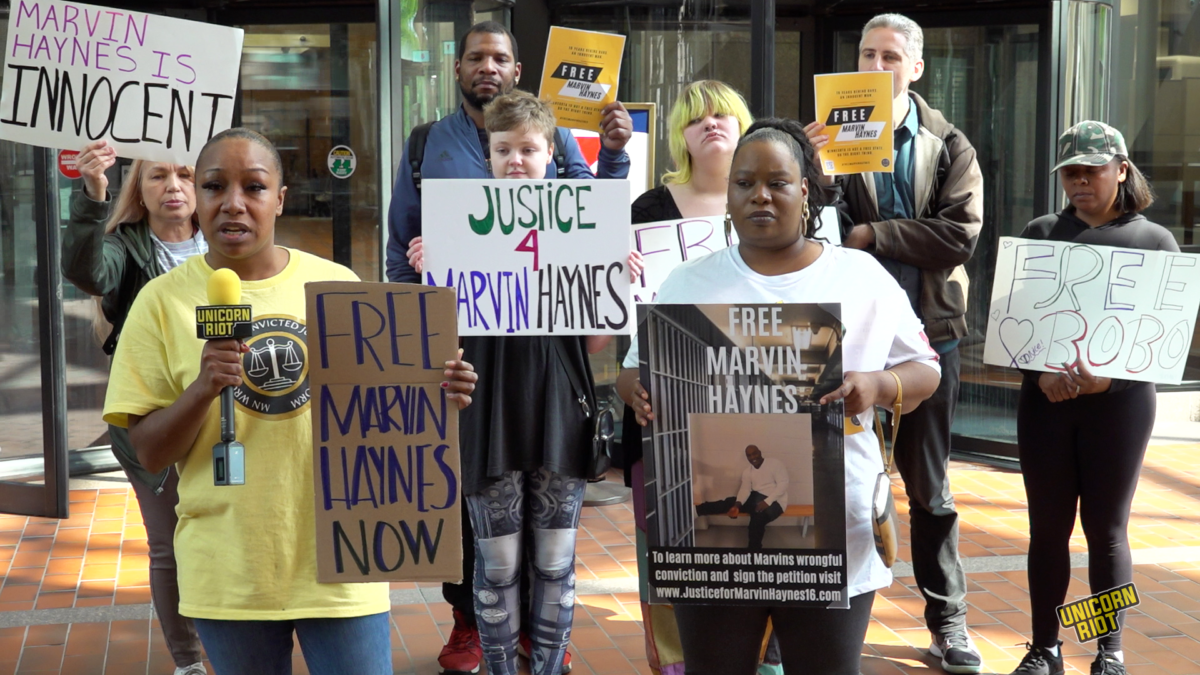
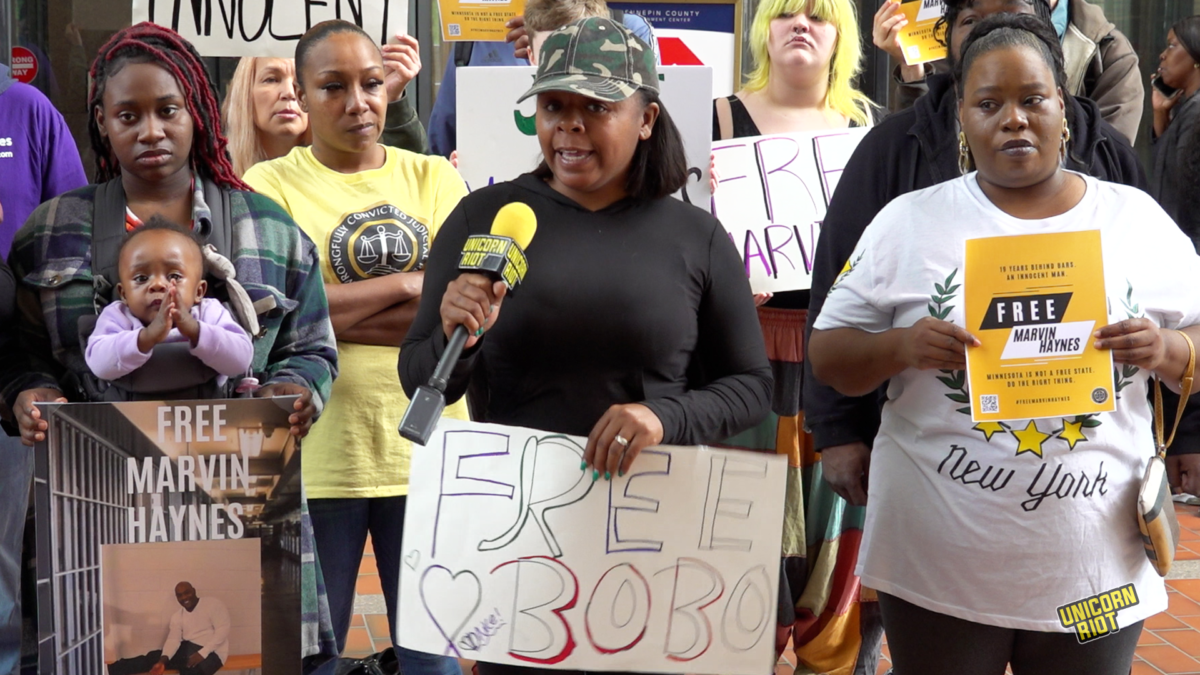
Deaunteze Bobo has been incarcerated since 2006 and sentenced to life in prison for a murder he says he didn’t commit. Similarly to Haynes, Bobo was convicted based on false testimony from a jailhouse confidential informant (CI). Bobo shared his shared his story and thanked his supporters from inside MCF – Rush City last December, see below.
Families in Hennepin County have consistently pointed to a large pattern of false testimony and coerced and threatened jailhouse witnesses that has led to many wrongful convictions of young Black men in the 2000s.
“You have documentation of these people’s innocence, there is no way they should still be sitting in prison. They need to be released now and Mary Moriarty, we’re counting on you to do that. Please do what you stated you was gonna do.”
Nakisha Armstrong, loved one Deaunteze Bobo has been wrongfully incarcerated since 2006
In June 2023, rallies were held for both Haynes and Bobo in front of Amy Klobuchar’s office and in the Hennepin County Government Center.
Small Steps as Hope Fades in Time
The nationwide Innocence Project works, among its many facets, to ‘transform systems’ and that includes creating legislative changes and other measures that can help prevent wrongful convictions. One of the latest transformations, actually directly related to Bobo’s and Haynes’ cases, is a newer law enacted in Minnesota concerning in-custody informants.
The Minnesota Statutes 634.045 JAILHOUSE WITNESSES is a new section of law enacted in late 2021 that forces prosecutors to disclose to the defense that a jailhouse witness is an informant and if they’ve made any deal with the state. Every September, county attorneys have to now log jailhouse informants into a database that’ll be annually published to the public.
These are small steps that advocates say could potentially impact the next Haynes and Bobo, keeping them from going through what Marvin and Deaunteze are currently going through.
As time continues to pass and the wrongfully incarcerated and overly sentenced fade from the spotlight, struggling family members continue their attempts to push for their loved ones’ freedom, for their release. With nearly two years in service, CRU has a lot of incarcerated people’s and their families’ hopes riding on them.
Despite having some of the state’s top professionals in the legal system, proper funding has not yet been provided to Minnesota’s highly-anticipated CRU. As Director Sperling, CRU staff, and the Advisory Board work on increasing their capacity, the hopes of those depending on it may live or die with the ability, or inability, to get funded.
Cover image features MN AG Keith Ellison next to Keaon Dousti, Outreach Coordinator in the MN AG Office, speaking with Marvina Haynes before an April 25, 2023 meeting at Saint Paul’s Town Square building. Photo contributed by Justine Vance.
See Unicorn Riot’s investigative series on The Case of Marvin Haynes in the links below:
The Case of Marvin Haynes Investigative Series
[Part One – Part Two – Part Three – Part Four – The Film]
Follow us on X (aka Twitter), Facebook, YouTube, Vimeo, Instagram, Mastodon, Threads, BlueSky and Patreon.

